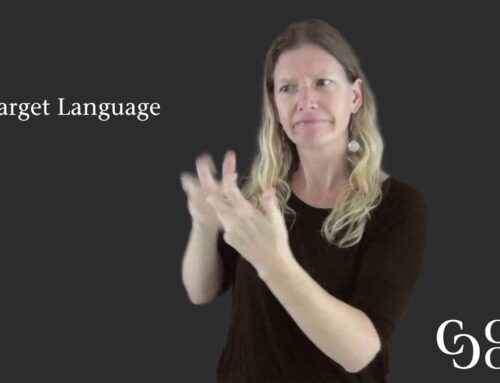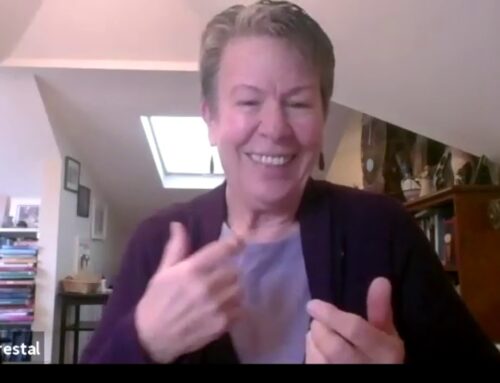Translations/summaries are available below in both Spanish and English. These are designed as resources for working with the text in ASL.
Visual Description
A Black man with a flattop wears a white short-sleeve t-shirt and stands in front of a dark grey background. He narrates the entire story. In the lower right corner of the video screen is a white CATIE Center logo.
Sobre la colaboración con intérpretes
Ok. Mi experiencia con intérpretes es muy variada. Recuerdo que a veces la disfrutaba y a veces no. Si la disfrutaba, quiere decir que el intérprete tenía algo que hacía que fuera fácil para mí prestar atención. Por ejemplo, uno de mis intérpretes favoritos en la Universidad Estatal de California en Northridge, o CSUN, es estupendo. Me gusta la manera en que enfrenta su trabajo. Estudia antes del trabajo, aunque ha interpretado la misma materia por muchos años y ya la conoce, pero se trata de cómo crea diferentes señas específicas para las clases de ciencias, términos científicos, a eso proceso me refiero. Se sienta conmigo, conversamos, desarrollamos las señas, vemos qué señas funcionarán y cuáles no se ajustan, no funcionan. Esa clase de interacción me ayuda entender y captar mis lecciones mejor. Aprecio esa clase de enfoque.
A veces los intérpretes llegan a la clase, quizá un poco desorganizados o tarde. Para mí, como estudiante en una universidad convencional, pienso que la puntualidad es importante. Si el intérprete llega tarde, entonces todos se van a quedar mirándome a mí y eso me molesta.
Creo que es importante tener una clase de relación con el intérprete. Si me gusta quién me está interpretando, es más fácil tener una conexión, ver y prestar atención; pero si no conozco a la persona, es más difícil para mí sentir que encajo con él y siento que no entiende tan bien mis señas.
On working with interpreters
I have had varied experiences with interpreters. Sometimes I enjoy interpreters and sometimes I don’t. If I enjoy the interpreters, then it means they have something that I find fascinating. For example, I have my favorite interpreter at CSUN. I like her approach to her work. She studied before her assignments and she has been doing it for many years. She challenged herself with different sign words for science class. She sat down with me and ask me different words before she interpreted for me. She interacted with me and helped me to understand. I appreciated that kind of approach.
Sometimes other interpreters would show up unprepared and signed sloppy. It reflected badly on me as a student in the mainstreamed university settings. When the interpreter showed up late, everyone looked at me which was really irritating.
I think it is important to have a relationship with the interpreters as it helps me to be more engaged in the class. If I don’t know who my interpreter is then it would be harder for me to connect and take in all the information I need.




